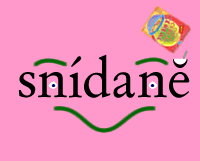I came across the Czech word spolubydlící [ˈspɔlʊbidliːtsiː] on a blog I read today and was pleased to realise that I could work out what it meant from its constituent parts. Spolu means together, byd is related to bydlet (to live), I didn’t know what lící signified, but correctly guessed that the word meant “house mate / roommate”.
I learnt spolu (together, along with, jointly, in company with) yesterday in the Czech lesson I was working my way through. It appears in the context, Musíme si někdy spolu zahrát (We must have a game together sometime). I’d come across bydlet before in such expressions as Bydlím v Praze (I live in Prague) and Bydlíte tu někde blízko? (Do you live somewhere near here?).
Other words containing spolu include:
- spoluautor – co-author
- spolucestující – travel companion, fellow traveller, passenger
- spoluhráč – playmate, team mate
- spolumajitel – co-owner, joint owner
- spoluobčan – fellow-citizen
- spolupráce – cooperation
By the way, what do you call someone you live with or share a house, flat, apartment, room or other dwelling with?
I would say house mate for someone you share a house with, flat mate for someone you share a flat with, and room mate for someone you share a room with.
